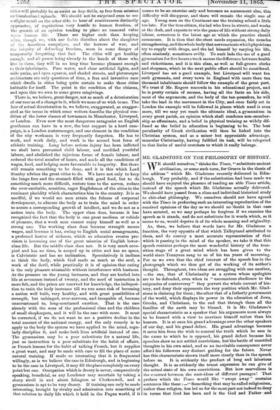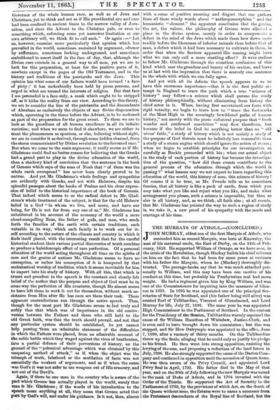MR. GLADSTONE ON THE PHILOSOPHY OF HISTORY.
" WE should ourselves," thinksthe Tines, "substitute ancient civilization, or some,sueh term, for Greece in the thesis of the address " which Mr. Gladstone recently delivered in Edin- burgh. Very probably, and if the substitution had been made we should have enjoyed the pleasure of reading an able Times article, instead of the speech which Mr. Gladstone actually delivered. We should have passed from a close and individual historical study to chit-chat philosophy. We ourselves should not have agreed with the Times in preferring such an interesting reproduction of the received opinions of the day as we should no xdoubt in that • case have secured, so we may perhaps be forgiven if we examine the speech as it stands, and do not substitute for it words which, as it seems to us, would deprive it of its whole meaning and originality.
As, then, we believe that words have for Mr. Gladstone a function, the very opposite of that which Talleyrand attributed to them, and do convey a most accurate representation of that which is passing in the mind of the speaker, we take it that this speech contains perhaps the most wonderful history of the tran- sition stage of a great mind which has been given to the world since Tennyson sang to us of his ten years of mourning. For us we own that the chief interest of the speech lies in the photograph which we thus get of the working of its author's thought. Throughout, two ideas are struggling with one another, —the one, that of Christianity as a system whose apologists are to be defended, even when in " unconscious obedience to the exigencies of controversy" they pervert the whole current of his- tory, and deny their opponents the very position which Mr. Glad- stone is claiming for them ; the other that of a fatherly government of the world, which displays its power in the education of Jews, Greeks, and Christians, to the end that through them all the families of the earth may be blessed. It is Mr. Gladstone's special characteristic as a speaker that his arguments seem always to be framed with a view to convince himself rather than his hearers. It is at once his grand advantage over the other speakers of our day, and his grand defect. His grand advantage because it saves him from the wish to conceal the truth which he sees in the cause to which he is opposed, his grand defect because his speeches show us not settled convictions, but%he battle of unsettled thoughts in his own mind, and as an inevitable consequence never afford his followers any distinct guiding for the future. Never has this characteristic shown itself more clearly than in the speech before us. It is evidently the product of long and laborious thought. It is as evidently the truest expression he can give of the actual state of his own convictions. But how marvellous is the contrast between the root-ideas of different passages! That preface which the Times would like " swept away " contains sentences like these : —" Something that may be called religionism, rather than religion, has led us for the most part not indeed to deny in terms that God has been and is the God and Father and Goiernor of the whole human race, as well as of Jews and Christians, yet to think and act as if His providential eye and care had been confined in ancient times to the narrow valley of Jeru- salem, and since the Advent to the Christian pale, or even to something which, enforcing some yet narrower limitation at our own arbitrary will, we think fit to call such." Or again :—" Let us, however, examine more particularly that opinion which has prevailed in the world, sometimes sustained by argument, oftener by stiffen/toe, sometimes lurking underground, and sometimes emboldened to assert itself in the face of day, that, although the Divine care extends in a general way to all men, yet we are to look for this preparation, at least for the positive parts of it, nowhere except in the pages of the Old Testament, and in the history and traditions of the patriarchs and the Jews. This opinion has what some of our fathers would have termed a face of piety ;' it has undoubtedly been held by pious persons, and urged in what are termed the interests of religion. But thAt face I am persuaded is a face only, a mask which ought to be stripped off, as it hides the reality from our view. According to this theory, we are to consider the line of the patriarchs and the descendants of Abraham as exclusively the objects of any divine dispensation which, operating in the times before the Advent, is to be reckoned as part of the preparation for the great event. To them we are to look as the guardians of all human excellence in all its infinite varieties; and when we seem to find it elsewhere, we are either to treat the phenomenon as spurious, or else, believing without sight, we are to consider it as derived, through some hidden channel, from the stores communicated by Divine revelation to the favoured race." But when we come to the main argument, it really seems as if Mr. 'Gladstone could find no better reason for believing that the Greeks bad a grand part to play in the divine education of the world, than a shadowy kind of conviction that the sentence in the book of Genesis which says of the sons of Noah that " of them was the whole earth overspread" has never been clearly proved to be untrue. And yet Mr. Gladstone's whole feelings and sympathies are evidently with Greeks, and not with Hebrews, despite his splendid passages about the books of Psalms and his clear etpres- *ion of belief in the historical importance of the book of Genesis. That indeed which seems to us the radical defect in Mr. Glad- stone's whole treatment of the subject, is that for the old Hebrew belief in a God " in wh orn we live, and move, and have our being, for He is not far from any one of us," Mr. Gladstone has substituted in his account of the economy of the world a mere -cloud-compelling Zees, the father of gods, and men, who sends forth the families of the earth with certain traditions, each valuable in its way, which each family is to work out for it- self according to the nature of the climate and country in which it Ands itself placed, with the interesting result that for the careful historical student their various partial discoveries of truth combine to produce a kaleidoscopic effect of rare perfection. Of a personal education' of the world acting throughout all time on the spirits of men and the genius of nations Mr. Gladstone seems to have no conception, or rather his conception of it is hampered by that ecclesiastical worship of tradition which it seems inevitable for him to import into his study'of history. With all this, that which is truest and grandest in the speech is the constant and clearly felt belief of the author that the purpose and object of God must be in some way the perfection of His creatures, though He almost seems to have left them to work it out for themselves, without much as- sistance from Him after He has once set them their task. These apparent centradictione run through the entire speech. Thus, though for the most part Mr. Gladstone seems to feel truly and nobly that that Which was of importance in the old contro- versies between the Fathers and those who still held to the old Greek faith, was that the truth should prevail, and not that any particular system should be established, he yet cannot help passing Irma an -admirable statement of the difficulties in which the Fathers were placed, from an admirable account of the noble battle which they waged against the vices of heathenism, into a partial defence of their perversions Of history, on the ground of the "polemical advantage which was obtained by this unsparing method of attack," as if, when the object was the triumph of truth, falsehood or the mutilation of facts was not essentially the weakest of arguments, and as if when the cause was God's it was not safer to use weapons out of His armoury, and not out of the Devil's. Again, if there be one man in the country Who is aware of the part which Greece has actually played in the 'world, surely that man is Mr. Gladstone; if the words of his introduction to the speech mean anything at all, they mean that Greece acted that part by God's will, and under his guidance. Is it not, then, almost with a sense of positive sneering and disgust that one gathers from all these windy words about " anthropomorphism " and the humanistic " element" the apparent conclusion that the genius, the art, the valour, the philosophy of Greece were allowed a place in the divine system, merely in order to compensate a defect in the mind of the Jews which made them bow down more readily before the likenesses of inferior animals than before that of man, a defect which it had been necessary to cultivate in them, in order that when the Saviour appeared His coming might have what we can only call a more startling effect? It were endless to follow Mr. Gladstone through the countless confusions of this kind which mar the grandeur and beauty of his oration, and leave us at last with the impression that there is scarcely one sentence in the whole with which we Can fully agree. And yet with all its defects the speech appears to us to have this enormous importance—that it is the first public at- tempt in England to trace the path which a true "science of history" may follow—a science which shall pursue the study of history philosophically, without eliminating from history the chief actor in it. When, having first ascertained our facts with rigid veracity, we begin to learn how to " trace the footmarks . of the Most High in the seemingly bewildered paths of human history," not merely with the pious collateral purpose that "fresh wonder and confirmed conviction" may flow therefrom, but because if the belief in God be anything better than an " old wives' fable," a study of history which is not mainly a study of the purpose of God therein must be infinitely less reasonable than a study of a steam engine which should ignore the action of steam ; when we begin to establish principles for our investigation as carefully as Buckle proceeded with his; when our actual object in the study of each poition of history has become the investiga- tion of the question, " how did these events contribute to the general process of the education through which the world is passing ?" what lessons may we not expect to learn regarding this education of the world, this history of men, this science of history ( Of course if it be true, as Mr. Fronde tells us he sometimes fancies, that all history is like a pack of cards, from which you may take what you like and reject what you like, and make what arrangement you please, such a science is impossible, but then so also is all history, and, as we think, all faith also ; at all events, that Mr. Gladstone has pointed the way to such a region of study is, we take it, a new proof of his sympathy with the needs and cravings of his time.































 Previous page
Previous page